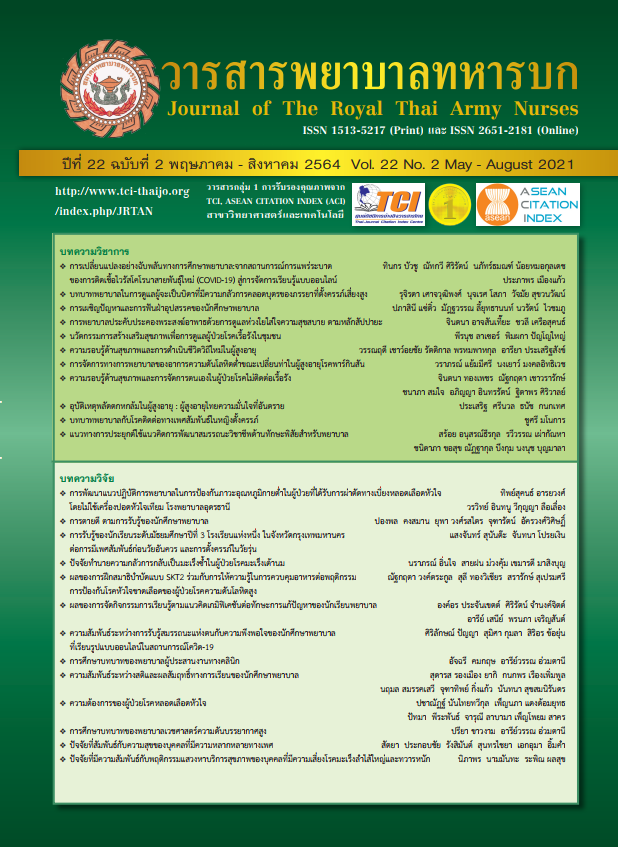Development of Army’s Personnel Rights Filtering Tool
Keywords:
Personnel Rights, Personnel Officer, Army Personnel, Personnel Rights Filtering ToolAbstract
This research designed a combination of both quantitative research and qualitative research. The objective were (1) to study Army personnel action handbook, survey the opinions on the use of the manual by collecting relevant data and analyzing it to obtain guidance, important information on the development of the Army personnel rights filtering tool, (2) to develop the Army’s personnel rights filtering tool and (3) to analyze the results of opinions on the effectiveness of the Army’s personnel rights filtering tool. In this research, data was collected from relevant personnel, both as part of the quantitative and qualitative research in which the data was collected by 3 steps: The first step was to collect quantitative data by distributing questionnaires to assess the quality of the personnel rights action manual for 95 people which are all personnel officers. The second step was to collect the qualitative data from in-depth interviews with a sample group of personnel rights experts who selected five specific samples. And the third step was to collect quantitative data by distributing the Army’s personnel rights filtering tool efficiency assessment form to a population of 95 people which are all personnel officers. The content validity indexes of these tools were 0.88, 1.00 and 1.00. The Cronbach’s alpha coefficient of 0.83, 0.94 and 0.97 respectively. Data analyzed by using frequency, percentage, average score and standard deviation.
The overall performance of the Army’s personnel rights filter was very good (µ = 4.39). When considered individually, it was found that the effectiveness of the Army personnel rights filtering tool in 4 areas: Functional Requirement Test was at very good level (µ = 4.53) , Functional Test was at very good level (µ = 4.51) , Usability Test was at very good level (µ = 4.41). Lastly, the Security Test was at a good level (µ = 4.13). Amry’s Personnel Rights Filtering Tool reduces the workload of the operator, able to meet the needs of the user and can be used for practical purposes.
Downloads
References
Department of Army Personnel and Personnel Division Army Operations Center. Army personnel rights operation manual. Bangkok: Royal Thai Army. 2017.
Chanphen K. Educational System Development for Thesis Study and Independent Study of Chiang Mai Graduate School. Bangkok: Chiang Mai University; 2010.
Thangkratok P, Cheevakasemsook A & Angsuchoti A. A Confirmatory Factor Analysis of Digital Competency of Thai ProfessionalNurses. Journal of Thai Royal Thai Army Nurse. 2019; 20(3): 267-85. (in Thai)
Niltaya T, Limpisthian S, Seenawat A, and Intharak C. Development of Knowledge Management Model for Quality Assurance in Education at Princess of Naradhiwas University. Journal Parichat. Tuksin University 2016; 29(2): 132-53. (in Thai)
Wadyim N, Wangchom S, Mano A. Teaching and learning management in nursing using electonic learning. Journal of Boromarajonani College of Nursing, Bangkok 2017; 33(3): 146-57. (in Thai).
Wisetsuk S. Development of a Quality Manual Using the Concept of Seven New Quality Control Instruments: A Case Study of the Water Resources Research Institute. Chulalongkorn University Bangkok: Chulalongkorn University,; 2009.
Iamrusameekun W. Development of information systems for risk management in hospitals Through the internet network, case study of Phanom Prai Hospital, Phanom Prai District, Roi Et Province. Rajabhat Maha Sarakham University. Mahasarakham. 2012
Janthaweesuk S,Siritarungsri B, Pamulila S, and Asdornwised U. The Development of an Enhancing Competency Program through Electronic Media for Perioperative Nurses to Care Patients with Brain Tumor Surgery at Sunpasitthiprasong Hospital. Journal of Thai Royal Thai Army Nurse. 2020; 21(3): 48-57. (in Thai)
Wongkaenkha A. Development of a support system for an online PDA file display program in the format of Jpeg. Chulalongkorn University. Bangkok. 2009.
Downloads
Published
How to Cite
Issue
Section
License
บทความหรือข้อคิดเห็นใดใดที่ปรากฏในวารสารพยาบาลทหารบกเป็นวรรณกรรมของผู้เขียน ซึ่งบรรณาธิการหรือสมาคมพยาบาลทหารบก ไม่จำเป็นต้องเห็นด้วย
บทความที่ได้รับการตีพิมพ์เป็นลิขสิทธิ์ของวารสารพยาบาลทหารบก
The ideas and opinions expressed in the Journal of The Royal Thai Army Nurses are those of the authors and not necessarily those
of the editor or Royal Thai Army Nurses Association.






